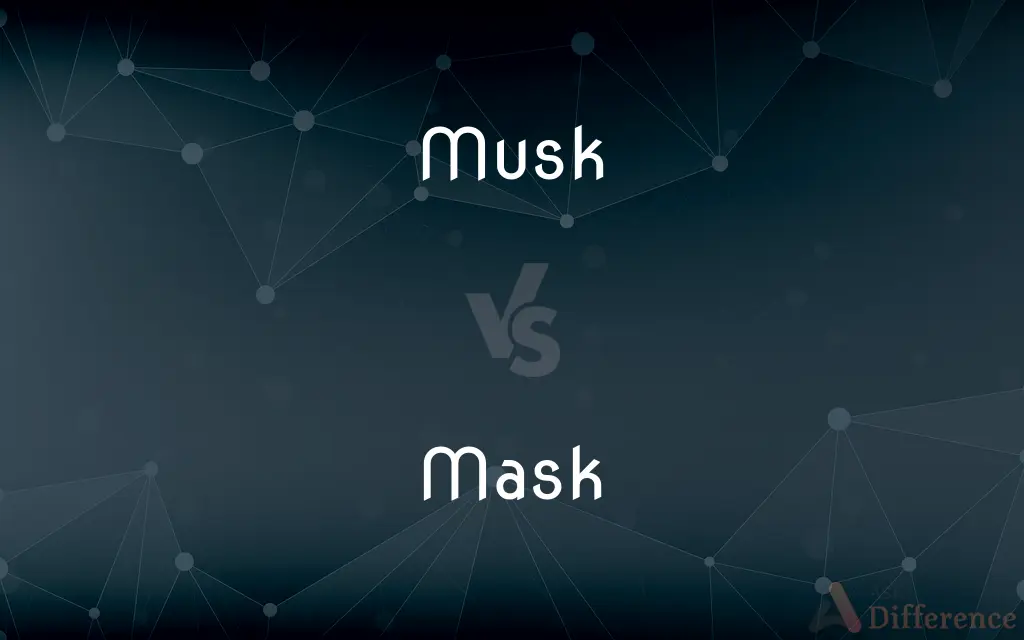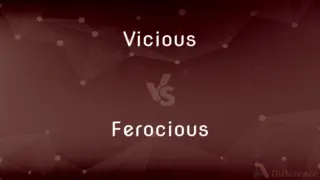Musk vs. Mask — What's the Difference?
By Fiza Rafique & Urooj Arif — Updated on March 3, 2024
Musk is a strong fragrance derived from animals or synthetically produced, used in perfumery, whereas a mask is a covering for the face, used for protection, disguise, or entertainment.

Difference Between Musk and Mask
Table of Contents
ADVERTISEMENT
Key Differences
Musk, originally sourced from the musk deer, is now often synthetically produced for use in perfumery to add a base note that gives depth and longevity to fragrances. On the other hand, a mask serves as a physical barrier, covering the nose and mouth or the entire face, to protect against environmental elements, pathogens, or to conceal one's identity.
While musk is valued for its unique scent profile, contributing to the complexity and allure of perfumes, masks are functional items designed for safety, health, and theatrical purposes. Musk's role in fragrance composition is to blend with other notes to create a harmonious scent, whereas masks are utilized in various contexts, including healthcare, construction, and performing arts, for protection or role-play.
The production of musk involves extraction from natural sources or chemical synthesis, reflecting the demand for this ingredient in luxury and everyday fragrances. Masks, however, are made from a variety of materials, including cloth, paper, plastic, or silicone, depending on their specific application, from medical-grade respirators to decorative costume pieces.
Musk's significance in perfumery lies in its ability to enhance the longevity and depth of fragrances, making it a staple in many formulations. In contrast, the importance of masks is underscored in their ability to filter air, prevent disease transmission, or create a character or disguise for theatrical performances.
The use of musk highlights human desire for appealing and complex scents, serving as a marker of personal style and sensory pleasure. Masks, conversely, reveal a practical or creative need to shield, conceal, or transform one's appearance, whether for health reasons, professional requirements, or artistic expression.
ADVERTISEMENT
Comparison Chart
Definition
A strong fragrance used in perfumery.
A covering for the face for protection or disguise.
Origin
Derived from musk deer or synthetically produced.
Made from materials like cloth, paper, or plastic.
Purpose
To add depth and longevity to fragrances.
To protect, disguise, or entertain.
Application
Perfumery.
Healthcare, construction, performing arts.
Significance
Enhances scent profiles in fragrances.
Filters air, prevents disease, or creates characters.
Material/Production
Natural extraction or chemical synthesis.
Varied materials based on use (cloth, paper, silicone).
Cultural/Social Role
Personal style and sensory pleasure.
Practical need or creative expression.
Compare with Definitions
Musk
A strong scent used as a base note in perfumery.
The perfume boasted a rich musk base that lingered all day.
Mask
Used in healthcare to prevent disease transmission.
Doctors wear surgical masks during operations.
Musk
Derived from the musk deer or produced synthetically.
Modern perfumes use synthetic musk for ethical reasons.
Mask
Reflects a need for safety, health, or creative expression.
The artist's mask creations were a hit at the gallery.
Musk
Valued for its complex scent profile in luxury perfumes.
The luxury perfume's allure was attributed to its musk notes.
Mask
Can be decorative or functional, depending on the context.
The carnival featured elaborate masks.
Musk
Known for enhancing the depth and longevity of fragrances.
Musk is essential for giving the fragrance its lasting power.
Mask
Made from various materials for different purposes.
The construction worker's mask was made of heavy-duty plastic.
Musk
A marker of personal style in scent selection.
He preferred colognes with a subtle musk undertone.
Mask
A mask is an object normally worn on the face, typically for protection, disguise, performance, or entertainment. Masks have been used since antiquity for both ceremonial and practical purposes, as well as in the performing arts and for entertainment.
Musk
Musk is a class of aromatic substances commonly used as base notes in perfumery. They include glandular secretions from animals such as the musk deer, numerous plants emitting similar fragrances, and artificial substances with similar odors.
Mask
A covering for the face for protection or disguise.
She wore a mask to protect herself from the dust.
Musk
A strong-smelling reddish-brown substance which is secreted by the male musk deer for scent-marking and is an important ingredient in perfumery.
Mask
A covering for all or part of the face, worn as a disguise, or to amuse or frighten others.
Musk
To perfume with musk.
Mask
A covering made of fibre or gauze and fitting over the nose and mouth to protect against air pollutants, or made of sterile gauze and worn to prevent infection of the wearer or (in surgery) of the patient.
Musk
An odorous glandular secretion from the male musk deer; used as a perfume fixative
Mask
A protective covering for the face or head.
Musk
The scent of musk
Mask
A covering for the nose and mouth that is used for inhaling oxygen or an anesthetic.
Mask
A covering worn over the nose and mouth, as by a surgeon or dentist, to prevent infection.
Mask
A person wearing a mask.
Mask
A protective covering worn over the face
Mask
Put a mask on or cover with a mask;
Mask the children for Halloween
Common Curiosities
What is the primary use of musk in products?
Musk is primarily used in perfumery to add depth, complexity, and longevity to fragrances.
How do materials used in masks vary?
Materials vary based on the mask's purpose, ranging from cloth and paper for simple coverings to silicone and plastic for professional-grade respirators.
Are all masks designed to filter air?
Not all masks are designed for filtration; some serve primarily for disguise or theatrical purposes.
Can masks be used for purposes other than protection?
Yes, masks can also be used for disguise, entertainment, or artistic expression, beyond their protective functions.
Is synthetic musk as effective as natural musk in perfumery?
Synthetic musk is widely used as an effective and ethical alternative to natural musk in fragrances.
How does musk influence personal style?
Musk influences personal style through scent selection, offering a form of sensory expression and identity.
Why is musk valued in luxury perfumery?
Musk is valued in luxury perfumery for its ability to add richness, sensuality, and lasting power to high-end fragrances.
Can masks contribute to artistic performances?
Yes, masks play a crucial role in creating characters and setting the tone in theatrical and artistic performances.
How has the role of masks evolved in society?
The role of masks has evolved from purely functional or ceremonial items to essential tools for health, safety, and creative expression.
What considerations are important when choosing a mask for health reasons?
When choosing a health-related mask, considerations include filtration efficiency, fit, and material suitability for the specific health need.
What makes musk a sought-after ingredient in perfumes?
Musk is sought after for its unique scent profile that enhances the fragrance's complexity and longevity.
How do musk and masks reflect cultural practices?
Musk reflects cultural practices in its use as a traditional scent enhancer, while masks are integral to various cultural, religious, and social ceremonies.
Are there ethical concerns associated with natural musk?
Yes, ethical concerns regarding animal welfare have led to a preference for synthetic musk in the industry.
What advancements have been made in synthetic musk production?
Advancements in synthetic musk production include developing molecules that mimic natural musk's scent without harming wildlife, ensuring sustainability and ethical sourcing.
Can the use of a mask affect communication?
Yes, wearing a mask can impact verbal and non-verbal communication, requiring adjustments in how we express ourselves.
Share Your Discovery

Previous Comparison
Chitlins vs. Tripe
Next Comparison
Vicious vs. FerociousAuthor Spotlight
Written by
Fiza RafiqueFiza Rafique is a skilled content writer at AskDifference.com, where she meticulously refines and enhances written pieces. Drawing from her vast editorial expertise, Fiza ensures clarity, accuracy, and precision in every article. Passionate about language, she continually seeks to elevate the quality of content for readers worldwide.
Co-written by
Urooj ArifUrooj is a skilled content writer at Ask Difference, known for her exceptional ability to simplify complex topics into engaging and informative content. With a passion for research and a flair for clear, concise writing, she consistently delivers articles that resonate with our diverse audience.














































